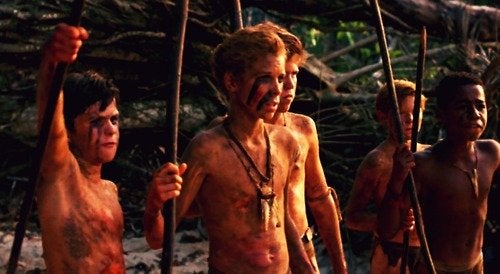Lord of the Flies is the most acclaimed work by british writer William Golding, published in 1954, not much recognition at the time of its release, but became highly appreciated years later when it became a classic of postwar English literature. It even became a film twice, in the 1963 and 1990s.
It is an allegory of human nature, in which each character represents an important aspect of people. Explore the creation of a society from a zero point by a group of children. How are roles defined?How do I choose a leader?
- The plot begins when a plane.
- Whose passengers are all children.
- Suffers an accident near a desert island.
- It is in this context that survivors must organize the thee to survive and try to be rescued.
- On an island.
- In the middle of nowhere.
- Where there are no rules.
- A group of children founded a new society.
- Throughout the book.
- We discover how evil can be born in anyone.
- Regardless of age.
- The lord of flies is a journey into the possibilities of human evil and all the faces that human beings can have.
“We’re never exactly as anyone thinks we are,” Lord of the Flies?
The title of the work itself is partly allegorical, because it alludes to the figure of Belzebuth, the figure of evil. The image of evil in history can be found in the boar’s head, which children place on top of a spear: the head. , in a state of decay, is surrounded by flies.
Arriving on the island, children come together in the hope of surviving and being found as soon as possible, demonstrating that human beings are in fact sociable by nature, perhaps conditioned by the society in which they had grown up, perhaps by fear and by the natural instinct for human survival, children decide to choose a leader and do so democratically. The leader is Ralph, who is not a smarter child than the others, but is more agile, stronger and awakens the trust of others.
What may have been an opportunity to challenge the orders imposed by adults, to show that children can be fairer and more rational, turns out to be a real disaster, from the moment the leader is chosen, rivalry begins to exist and then hatred. it arises that it will lead to a tragic and uncontrolled situation, without adults, without laws, they decide for themselves:
These children establish a hierarchy, an order inspired by the world they know, but which will become corrupted and lead to radicalization. In the face of fear, no one needs a rational approach, just a strong leader who ensures tranquility and food for all.
? What are we? People? Animals, Wild?? ? Lord of the flies?
The lord of the flies intends to give a quid pro quo to Rousseau’s theory, which said that man in his natural state was good and did not know evil, with society being responsible for corrupting him and making him evil. On the contrary, children are free, are in a totally natural state and yet in the absence of society, in the absence of norms, let themselves be carried away by their perverse nature and act in a totally irrational way.
The other side of the coin would be Hobbes, who argues that society regulates human evil and makes us behave like rational beings. It is at this point that Golding’s work would be located, which, although he tried to choose a leader and create a society, shows a group of children who cannot help but feel that, although they are free on the island, they do not need to obey the rules.
We see that, at first, children try to imitate the behavior of the world they knew before, the world of adults, find a shell on the beach, and even make it a symbol of democracy that serves to give voice to others. They organize to keep fire, feed and work together, but soon all this democratic utopia fails.
Do some children think that the island is a dream place, without parents, without teachers, why then obey orders?Why behave according to the rules? Leaders play a crucial role and children choose who they want to join until war broke out between the two groups.
Rumors that a beast inhabits the island frighten all children and support the one who seems stronger; others end up seeing freedom and power nurture their wildest instincts. Thus, the island, which was originally paradisiacal, ends up becoming a true hell full of destruction.
“This is our island, we can have fun until the adults come looking for us. ” Lord of the flies?
The work speaks not only of human nature, or of the loss of childhood innocence, but also of the organization of a society. In every way, children create a new hierarchical order from scratch, in which we can see different roles that they remember easily. us from real-world people.
Children are divided, as in our world, by political ideas, and even face each other in a war where rationality is completely out, they do not reward intelligence, they do not seek a leader who follows reason. They want a strong leader to protect them from their fears at all costs.
All of this reminds us a lot of the world as we know it, the way we choose our leaders and live our lives, which even raises the question of whether democracy really exists, or even if it is possible. in which everyone should have a voice, that utopia that originally existed for children and that end up destroying, it is possible to identify and wonder if in the real world the same thing did not happen.
“You must understand that fear can do no more harm than dreams. “Lord of the flies?

